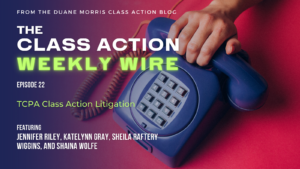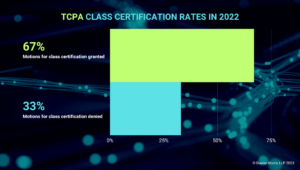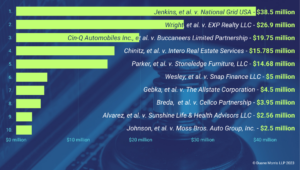Duane Morris Takeaway: This week’s episode of the Class Action Weekly Wire features Duane Morris partners Jennifer Riley, Katelynn Gray, Sheila Raftery Wiggins, and associate Shaina Wolfe with their analysis of key trends and notable rulings in the class action landscape of the Telephone Consumer Privacy Act (“TCPA”). We hope you enjoy the episode.
Episode Transcript
Jennifer Riley: Thank you for being here again, for the next episode of our Friday weekly podcast, the Class Action Weekly Wire. I’m Jen Riley, partner at Duane Morris, and joining me today are partners Sheila Raftery Wiggins and Katelynn Gray and associate Shaina Wolfe. Thank you guys for being on the podcast today.
Today we wanted to discuss trends and important developments in Telephone Consumer Protection Act or “TCPA” class action litigation. The TCPA has long been a booming focus of consumer litigation, particularly in the class action space. The statute was enacted in 1991 – it’s a federal statute – it’s aimed at protecting consumers from companies that use ATDS, meaning automatic telephone dialing systems, to engage in mass telemarketing methods, including robocalls. The TCPA originally focused on unwanted telephone calls and faxes. For many years, plaintiffs successfully have alleged that a defendant used an automatic telephone dialing system (ATDS) to call or send messages to a cell phones without obtaining prior express consent.
Sheila, can you explain some of the recent Supreme Court litigation governing the TCPA’s interpretation – in particular, what constitutes an autodialer?
Sheila Raftery Wiggins: Sure, Jen. In 2021, the U.S. Supreme Court issued its ruling Facebook, et al. v. Duguid, which adopted a narrow interpretation of what devices count as an ATDS. Before Duguid, some federal circuits held that equipment could qualify as an autodialer just because it autodialed stored phone numbers that had not been randomly or sequentially generated in the first instance. But the Supreme Court rejected this interpretation and held that “a necessary feature of an autodialer under § 227(a)(1)(A) is the capacity to use a random or sequential number generator to either store or produce phone numbers to be called,” because the contrary interpretation “would capture virtually all modern cell phones, which have the capacity to store telephone numbers to be called and dial such numbers.”
Jen: Got it. Are there other types of communication governed by the TCPA?
Katelynn Gray: As you can imagine, Jen, the TCPA was enacted thirty years ago, so of course the methods and the technologies that businesses use to engage customers now has changed. I’m sure all of you have received text messages from businesses for a variety of different reasons, including to communicate with customers, solicit consumer feedback, announce product promotions, identify the status of a delivery, even utilize two-factor security authentication. So, as a result of that – as a result of the changes that have occurred in the last thirty years – courts have now begun interpreting the TCPA to include text messages. The TCPA also empowers the Federal Communications Commission, or something that we refer to as the FCC, to “prescribe regulations to implement” the statute, and to create exemptions to statutory liability “by rule or order.” 47 U.S.C. § 227(b)(2)(B). So under this authority, the FCC has actually created a “two-tier system of consent” for TCPA liability, with different kinds of calls essentially requiring different types of consent.
Jen: Shaina, can you talk about how successful the plaintiffs’ bar has been in obtaining class certification in TCPA class action cases?
Shaina Wolfe: The plaintiffs’ bar was fairly successful in 2022 where they sought class certification over TCPA issues, particularly relating to or involving robocalls. The plaintiffs’ bar won 67% of motions for class certification, and companies secured denials in 33% of the decisions.
Jen: So it sounds like the plaintiffs’ bar has been fairly successful overall. Sheila, can you comment on some of the notable successful certification rulings in this space?
Sheila: Sure – in Head, et al. v. Citibank, N.A., the plaintiff received 100 robocalls from the defendant, a bank, over the course of three months regarding an overdue credit account of a man she did not know. The plaintiff was never a customer of the defendant and did not authorize the man or anyone else to open an account with the defendant using her cellphone number. The plaintiff filed a class action, alleging that the defendant routinely violated the TCPA by placing calls using an artificial or prerecorded voice to telephone numbers assigned to a cellular telephone service, without prior express consent. The court granted the motion. The court explained that the defendant did not deny that it places billions of calls each year regarding delinquent accounts, or that millions of accounts in its system are marked “wrong number” and that at least one unsolicited call must be placed to the number before a telephone number is marked wrong. Moreover, the court noted that the defendant did not dispute that it called the plaintiff repeatedly before it marked the account associated with her number “cease-and-desist,” making a clear inference that there may be numbers not yet marked “wrong,” “no consent,” or “cease-and-desist” for which the defendant does not have authorization to robocall. The court also found that the proposed class satisfied the typicality and commonality requirements, that common questions of law and fact predominated, and that in the absence of a class action, thousands of meritorious claims would likely go unredressed because the cost of litigation would dwarf any possible reward under the TCPA.
Jen: Thanks so much Sheila. Katelynn, were there any memorable class certification rulings denying certification in 2022?
Katelynn: So there was one that I’ll talk about, but I just would generally say in 2022 it seems that defendants in TCPA class actions continued to succeed in defeating class certification by demonstrating that the proposed representative, or the individual who sought to represent the class, was inadequate or atypical, so essentially didn’t have anything in common with the other class members – especially where the circumstances surrounding their consent distinguish them from those other class members. So one of those examples was a case called Bustillos, et al. v. West Covina Corp. Fitness. This was a case where a former gym member went into the defendant’s gym and he provided his phone number to an employee who entered it into his profile – and I’m sure a lot of us do this all the time. Unfortunately for the company, the phone number provided was actually one digit off from the actual number of the former gym member – and belonged to the plaintiff in this case. At one point, the defendant authorized its marketing agency to send out a one-time pre-recorded telephone message to former gym members and guests who had expressed interest in joining the gym at a certain point – essentially inviting them to join or rejoin. Most of these individuals had provided their telephone numbers when they filled out a guest registration or a contract with the defendant when they joined the gym the first time. The plaintiff was one of 1,400 individuals that received a pre-recorded message on her cell phone from the defendant offering a gym membership promotion. So in this instance, the Court denied certification because they found the plaintiff in this case did not allege or produce evidence that any of the other messages were sent to wrong numbers and therefore found she was not typical to the members of the class she proposed to represent.
Shaina: Another common reason that courts deny class certification in TCPA cases is due to predominance of an individualized issue. For TCPA cases, one of the most powerful affirmative defenses is showing consent to the telemarketing messages. Courts have tended to rule in favor of defendants where they can show that a substantial portion of the proposed class consented to the communications; the purpose and nature of each communication varied from person to person; or identifying who provided consent and who did not would be impractical or impossible. There were also several case rulings that demonstrated this defense, including Cooper v. Neilmed Pharmaceuticals, Inc., where the defendant successfully offered five methods by which it received prior express invitation or permission from recipients before sending faxes, which creates almost a sort of presumption that the consent issue will be individualized.
Jen: Before we turn to settlements, if I recall the largest TCPA jury verdict ever was overturned on appeal last year, is that correct?
Sheila: That’s correct. The largest TCPA jury verdict involved in an award of $925 million, however, the defendant successfully overturned the verdict on appeal. In Wakefield, et al. v. ViSalus, Inc., the plaintiffs filed a class action alleging that the defendant made unlawful telephone calls using prerecorded voice messages in violation of the TCPA. Following a trial, the jury returned a verdict in favor of the plaintiffs and found that the defendant sent over 1.8 million prerecorded calls to class members without prior express consent. Accordingly, the jury awarded the minimum statutory damages of $500 per call for a verdict against the defendant of $925 million. The defendant filed a post-trial motion challenging the constitutionality of the statutory damages award under the due process clause of the Fifth Amendment as being unconstitutionally excessive. The district court denied the motion. On appeal, the Ninth Circuit vacated and remanded the district court’s denial of the defendant’s motion. On appeal, the defendant contended that even if the TCPA’s statutory penalty of $500 per violation was constitutional, an aggregate award of $925,220,000 was so “severe and oppressive” that it violated the defendant’s due process rights. So this case has ultimately obtained an extension of time from the Supreme Court to file a petition for certiorari.
Jen: Wow, we will absolutely keep listeners updated as to what happens next in that case. As far as TCPA settlements, I doubt there were any quire that large, but were there any significant settlements over the past year – Shaina, can you comment on that?
Shaina: I can. Although none were in the hundreds of millions, there were several multi-million class-wide TCPA settlements in 2022. Four of the top 10 were over $15 million and the value of the top 10 totaled over $134 million.
Jen: Thanks Shaina. Great insights and analysis, everyone. I know that these are only some of the cases that had interesting rulings over the past year in the TCPA class action space. The remainder of 2023 is sure to give us some more insights into the ways that class actions are evolving in the TCPA class litigation area. Thanks again everybody for joining us today, thanks to the panel – we look forward to connecting again next Friday on the next episode of the Class Action Weekly Wire.



